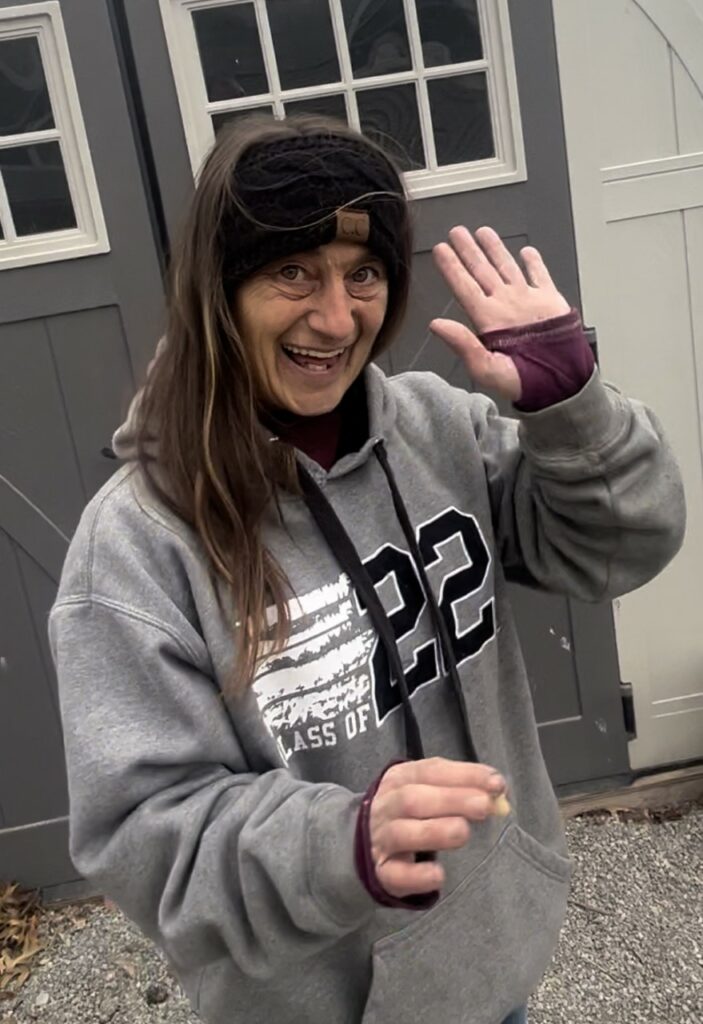“Hero” is a word that is often overused. To me, it means a person who sacrifices themself for the good of others, not for reward, but simply because it is right. Looking back, most of my childhood idols weren’t actually “heroes”– “selfless” does not describe the motivations of most baseball players or rock stars. (Sorry, George Brett.) But, thanks to my time at Shep’s Place, I do know some people who truly are heroes. Let me tell you about them.
One of my jobs at Shep’s is “Dog Finder.” When someone at a rescue or shelter has an old dog they would like to place, they contact us. I then find out more about the dog, to see if they would be a good fit. If all goes well, they go on the Waitlist, and several weeks or months later, my wife and I hit the road to fetch the dog back to Shep’s.
So it was, on a cold day last December, I found myself lost in Bendena, KS, looking for the Doniphan County Pet Rescue. I was scheduled to meet a woman named Becky Bokay, who would introduce us to Brandi. Bendena is typical of the towns we usually visit: small, rural, with farmland in all directions. I called Becky, and she pointed me down a gravel road to the shelter… which turned out to be her house.
As with many small communities, Bendena did not have an animal shelter. So Becky started one. She put up some dog pens in her backyard, and started taking in strays, like Brandi. She cares for the dogs herself, with the assistance of some supporters. For stray dogs in the area, Becky’s house is the only refuge; there is no other rescue or shelter in the county.
To me, Becky is a true hero. And, after visiting over 30 shelters, I know that she is hardly alone. Across the landscape, there is a tenuous network of women –they are almost invariably women – who sacrifice their time and energy to the largely thankless task of saving and protecting dogs in need. (And cats, too, I guess 
I often wonder what draws these women to the profession. The work is grueling. The pay, if there is any, is low. Society assigns little social status to the career. It’s certainly not a feel-good job most of the time; animals do not end up in shelters because things have gone well for them. Every one has a story that involves human abuse or neglect, poverty, or illness. And, despite the workers’ best efforts, the stories don’t always end well. Week in and week out, shelter workers deal with more heartbreak than many people can bear.
Why do they do it? Because to them, animal care is not a job, but a calling. Shelter workers are blessed (or cursed) with a heightened sense of empathy. They feel an animal’s pain, or hunger, or loneliness, and they know, if the situation were reversed, how grateful they would be if a person took them in, and fed them, and healed them. It’s the Golden Rule extended to the animal kingdom: Do unto dogs as you’d wish someone would do if you were in their place. And sometimes the stories do have happy endings. Some dogs get better, find homes, and have fulfilling lives, and that makes the heartbreak worthwhile.
So, as much as I admire rock stars, my true heroes these days are animal care workers. (Sorry, Geddy Lee.) I have seen them in action, and I know the difference they make in animals’ lives. They devote themselves day after day to a difficult, largely unappreciated job, not for money or status, but purely out of the goodness of their hearts, and their love of animals. Society does not value or thank them enough for what they do. On behalf of Shep’s Place, and all dogs and dog-lovers, thank you, shelter angels. You have our utmost respect and gratitude.
